| | | OFFLINE | | Post: 20.947
Post: 3.584 | Registrato il: 28/08/2005
Registrato il: 20/01/2009 | Administratore | Utente Master | |
|


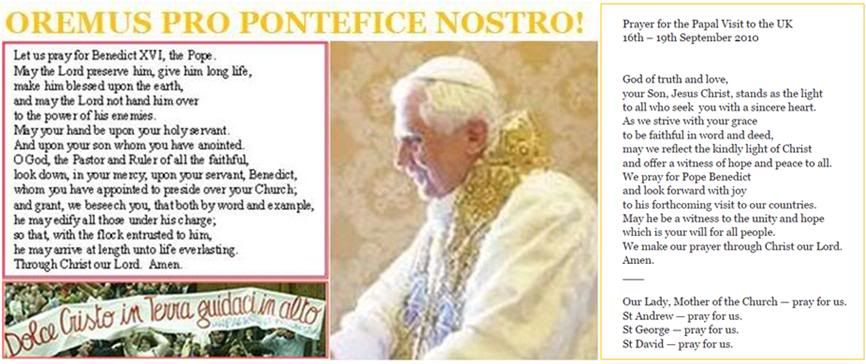
 Please see preceding page for earlier posts today, 9/8/10.
Please see preceding page for earlier posts today, 9/8/10.
 GENERAL AUDIENCE TODAY
GENERAL AUDIENCE TODAY
Catechesis on
Hildegarde von Bingen - Part 2
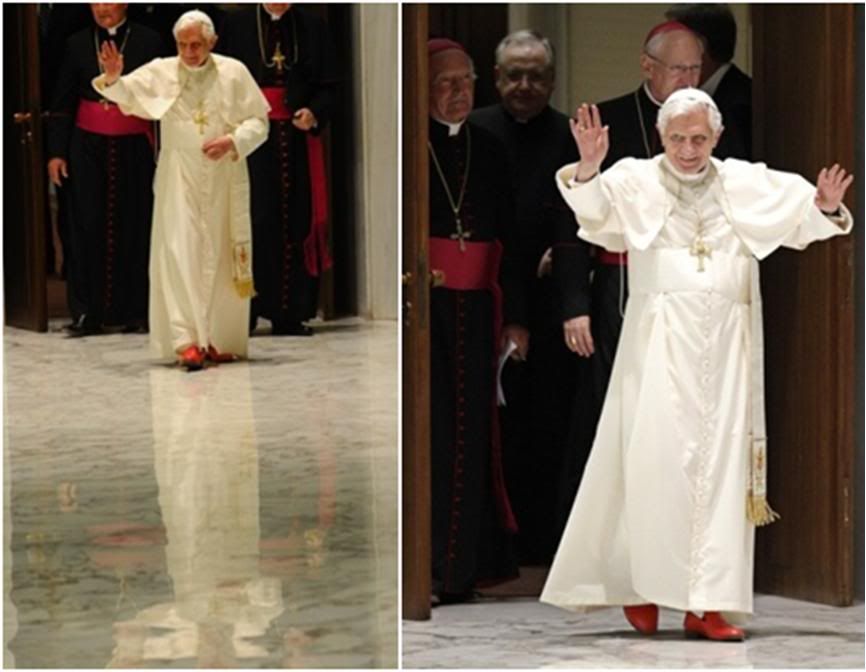
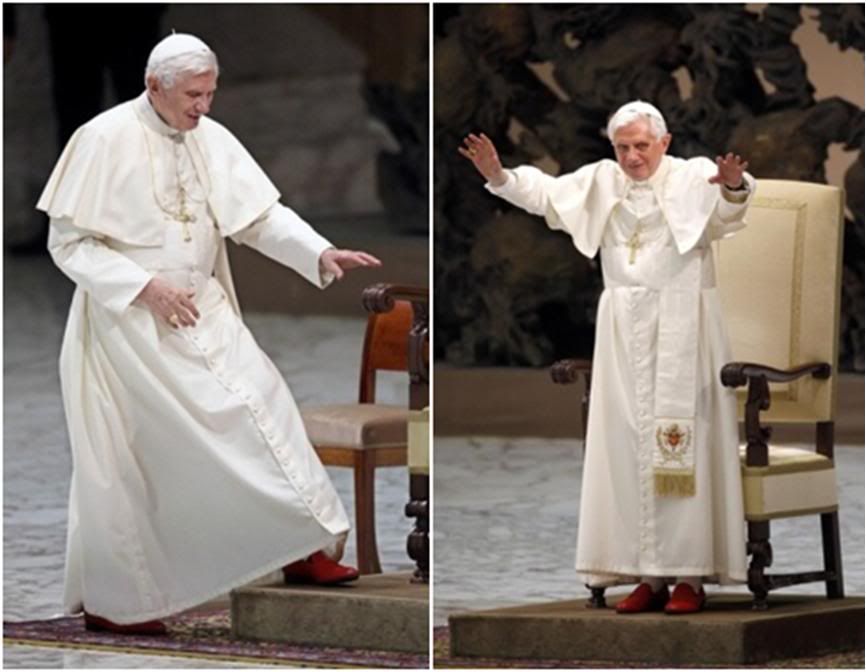
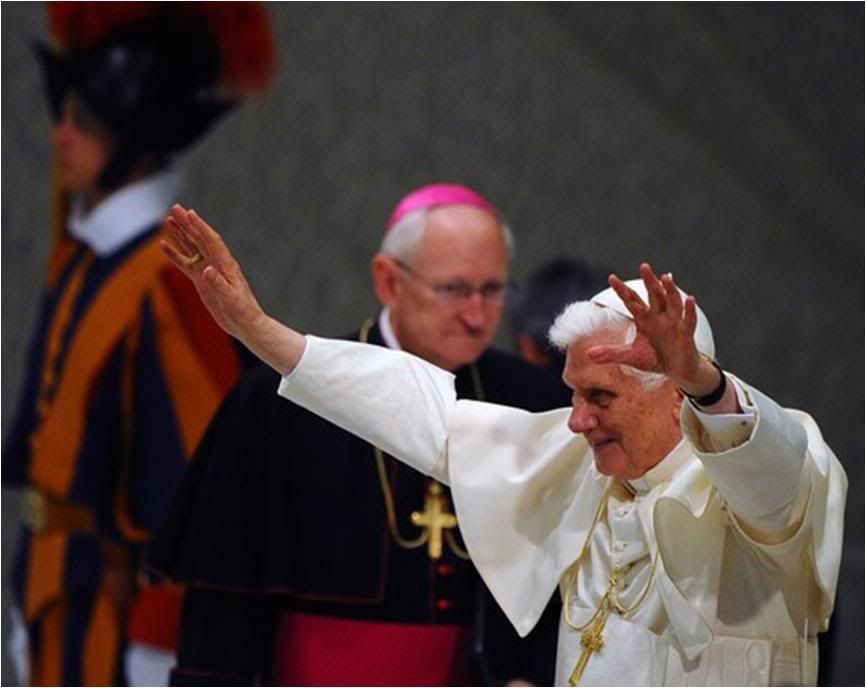
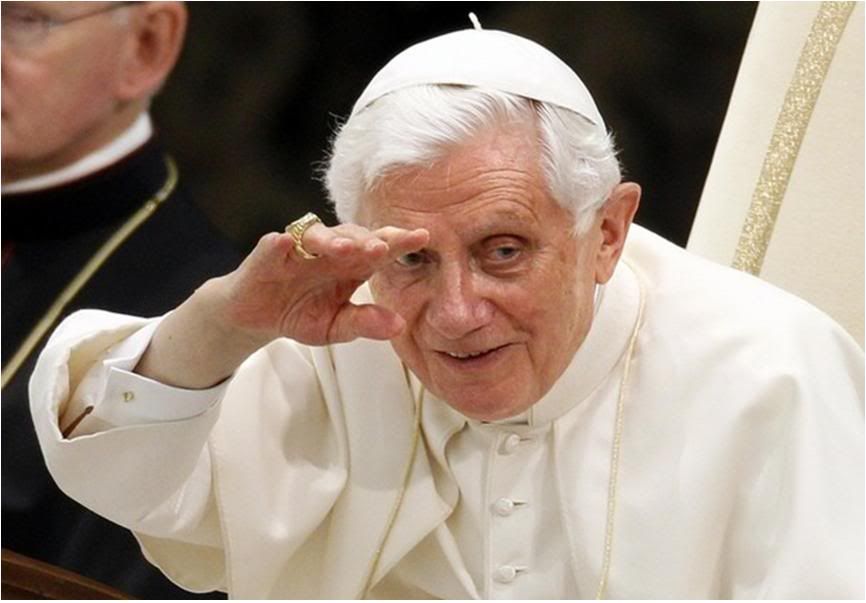
The Holy Father today flew from Castel Gandolfo to the Vatican for the General Audience at Aula Paolo VI. He concluded his catechesis on the medieval German mystic Hildegarde von Bingen and delivered a message for the people of the United Kingdom in anticipation of his coming visit.
Here is his synthesis in English of the catechesis:
In our catechesis on medieval Christian culture, we turn again to Saint Hildegard of Bingen, the great nun and mystic of the twelfth century.
Hildegard’s celebrated visions vividly interpreted the word of God for her contemporaries, calling them to a committed Christian life.
She brought a woman’s insight to the mysteries of the faith. In her many works she contemplated the mystic marriage between God and humanity accomplished in the Incarnation, as well as the spousal union of Christ and the Church.
She also explored the vital relationship between God and creation, and our human calling to give glory to God by a life of holiness and virtue.
Hildegard’s musical compositions reflect her conviction that all creation is a symphony of the Holy Spirit, who is himself joy and jubilation. Her vast learning and spiritual authority also led her to work for the renewal of the Church in her day.
Through Saint Hildegard’s intercession, let us ask the Spirit to raise up wise, holy and courageous women whose God-given gifts will enrich the life of the Church in our own time!
After his English-language greeting, the Holy Father read a pre-visit message to the people of the United Kingdom, which has also been released as a video shown in the host country:
I am very much looking forward to my visit to the United Kingdom in a week’s time and I send heartfelt greetings to all the people of Great Britain.
I am aware that a vast amount of work has gone into the preparations for the visit, not only by the Catholic community but by the Government, the local authorities in Scotland, London and Birmingham, the communications media and the security services, and I want to say how much I appreciate the efforts that have been made to ensure that the various events planned will be truly joyful celebrations.
Above all I thank the countless people who have been praying for the success of the visit and for a great outpouring of God’s grace upon the Church and the people of your nation.
It will be a particular joy for me to beatify the Venerable John Henry Newman in Birmingham on Sunday 19 September. This truly great Englishman lived an exemplary priestly life and through his extensive writings made a lasting contribution to Church and society both in his native land and in many other parts of the world.
It is my hope and prayer that more and more people will benefit from his gentle wisdom and be inspired by his example of integrity and holiness of life.
I look forward to meeting representatives of the many different religious and cultural traditions that make up the British population, as well as civil and political leaders.
I am most grateful to Her Majesty the Queen and to His Grace the Archbishop of Canterbury for receiving me, and I look forward to meeting them.
While I regret that there are many places and people I shall not have the opportunity to visit, I want you to know that you are all remembered in my prayers.
God bless the people of the United Kingdom!
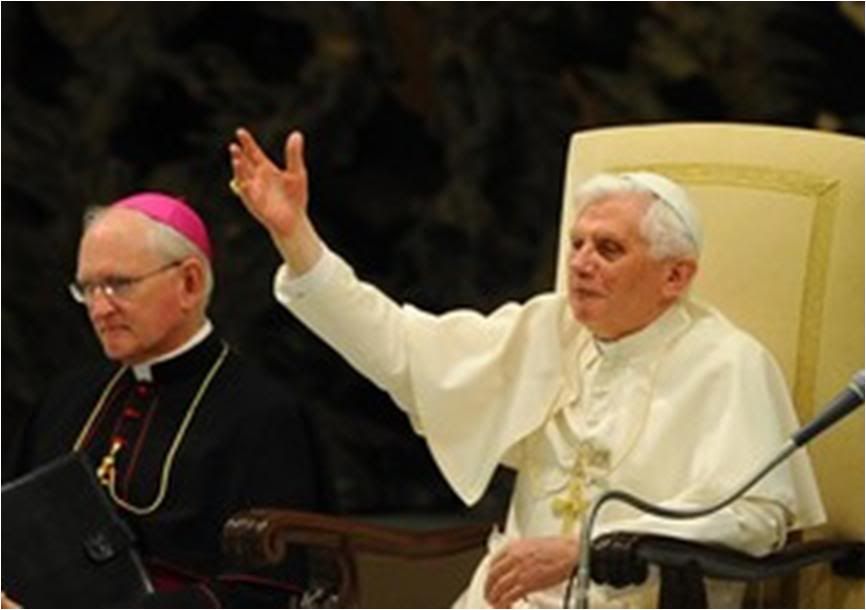
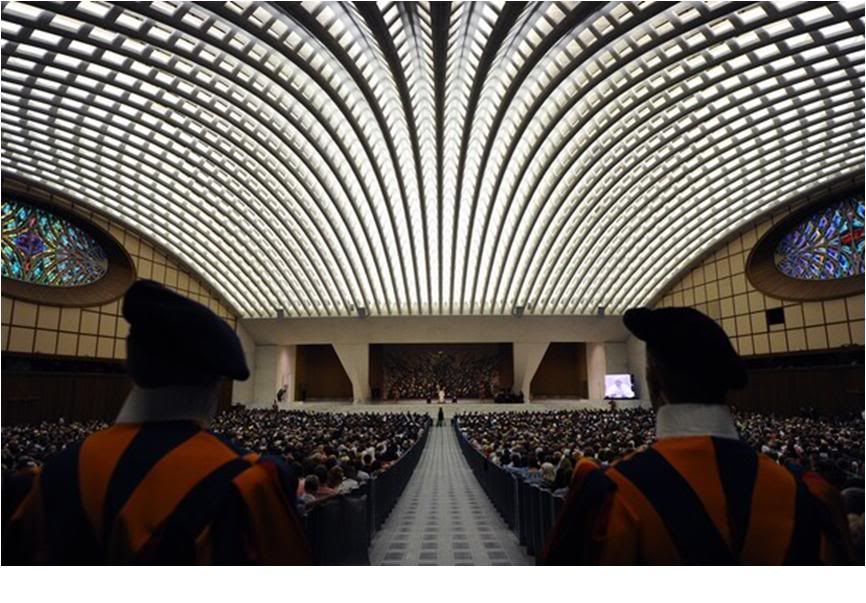
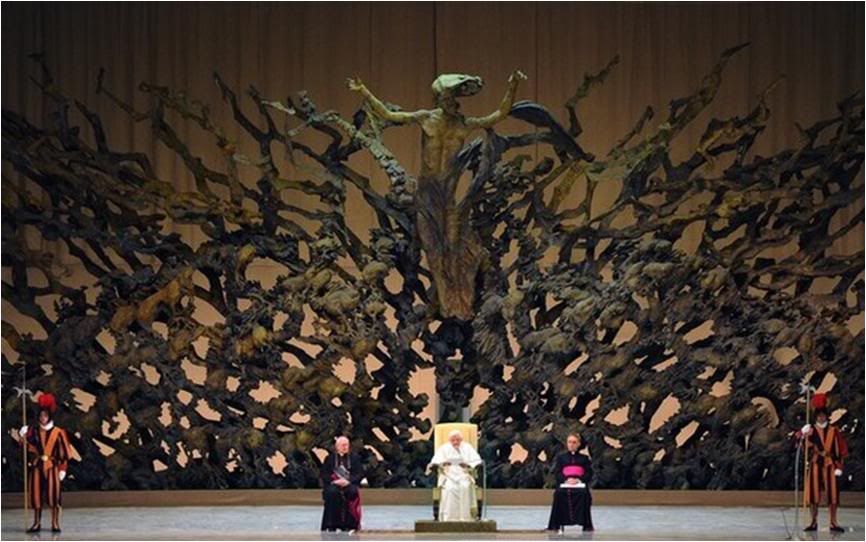 Here is a full translation of the catechesis today:
Here is a full translation of the catechesis today:
Dear brothers and sisters:
Today I wish to continue reflecting on St. Hildegarde von Bingen, an important female figure of the Middle Ages, who was distinguished for her spiritual wisdom and the holiness of her life.
The mystical visions of Hildegarde resemble those of the Old Testament prophets: Expressing herself in the cultural and religious terms of her time, she interpreted Sacred SCriptures in the light of God, applying them to the various circumstances of life.
Thus, all those who listened to her felt called on to practise a style of Christian life that was consistent and committed. In a letter to St. Bernard of Clairvaux, the mystic from the Rhineland confessed: "The vision conquers my whole being: I do not see with the eyes of the world, rather, it comes to me in the spirit of mysteries... I know the deep significance of what is expressed in the Psaltery, in the Gospels and in other books which are shown to me in vision. It burns like a flame in my breast and in my soul, and teaches me to profoundly understand the texts" (Epistolarium pars prima i-xc: cccm 91).
The mystical visions of Hildegarde are rich with theological content. They refer to the principal events in the history of salvation, told in a language that was mainly poetic and symbolic.
For example, in her most famous work, entitled Scivias (meaning 'I know the ways'), she summarizes in 35 visions the events of the story of salvation, from the creation of the world to the end of times.
With characteristic female sensibility, Hildegarde, in the central part of this work, develops the theme of the mystical marriage between God and mankind realized in the Incarnation.
Similarly, on the wood of the Cross, the marriage is consummated between the Son of God and the Church, his spouse, filled with grace and made capable of giving God new children in the love of the Holy Spirit (cfr. Visio tertia: PL 197, 453c).
In these brief indications we can see how even theology can receive a special contribution from wome, because they are able to speak about God and the mysteries of the faith with a special intelligence and sensibility.
Thus I encourage all those who carry out this service (theology) to fulfill it with a profound ecclesial spirit, nourishing reflection with prayer ,and looking at the great wealth, still unexplored in part, of traditional medieval mysticism, especially that represented by luminous models like Hildegarde von Bingen.
The Rhenanian mystic was the author of other writings, two of which are particularly important because they record, like Scivias, her mystical visions: the Liber vitae meritorum (Book of the merits of life) and the Liber divinorum operum (Book of divine works), which is also called De operatione Dei (Of God's work).
In the first, she describes a unique and powerful vision of God who vivifies the cosmos with his power and his light. Hildegarde underscores the profound relationship between man and God, and reminds us that all creation, of which man is the peak, receives life from the Trinity.
The writing is focused on the relation between virtue and vice, and that man must daily face the challenge of vices, which take him away from the path towards God and the virtues that advance progress in this path. She asks us to distance ourselves from evil in order to glorify God so that we may enter, after a virtuous existence, into a life that is 'all joy'.
The second title, considered by many to be her masterwork, describes creation in relation to God and the centrality of man, manifesting a strong Christocentrism, with Biblical and patristic flavor. The saint, who presents five visions inspired by the Prolog of the Gospel of St. John, recalls words that the Son addresses to his Father: "I have brought to completion all the work that you wanted done and that you entrusted to me, and here I am in you, and you in me, and we are one" (Pars iii, Visio x: PL 197, 1025a).
Finally, in other works, Hildegarde manifests the versatile interests and cultural liveliness of the female monasteries of the Middle Ages, contrary to the prejudices that still weigh against that epoch.
Hildegarde occupied herself with medicine and the natural sciences, as well as music, for she was endowed with artistic talent. She composed hymns, antiphons and songs, which have been collected under the title Symphonia Harmoniae Caelestium Revelationum (Symphony of the harmony of celestial revelations), which were joyously performed in her convents, creating an atmosphere of serenity, in works that have come down to our time. For her, all of creation was a symphony of the Holy Spirit, who is himself joy and jubliation.
The popularity that surrounded Hildegarde impelled many persons to seek here attention. Because of this, many of her letters are available to us. male and female monasteries, bishops and abbots, wrote to her. Many of her responses continue to be valid even for us,
For example, to a female religious community she wrote: "Spiritual life must be tended with great dedication. At the start, the work is harsh. Because it requires renouncing caprice, the pleasures of the flesh and similar things. But if you allow yourself to be fascinated by holiness, a holy soul will find even the contempt of the world kind and loving. You only need to pay intelligent attention that your soul does not wither" (E. Gronau, Hildegard. Vita di una donna profetica alle origini dell'età moderna [Life of a prophetic woman at the origins of the modern era], Milano 1996, p. 402).
And when the Emperor Frederick Barbarossa caused an ecclesial schism by opposing as many as three anti-Popes to the legitimate Pope Alexander III, Hildegarde, inspired by her visions, did not hesitate to remind him, that even he, the emperor, was subject to the judgment of God.
With the daring that characterizes every prophet, she wrote the Emperor these words that God might have said to him: "Woe to the evil conduct of the godless persons who spurn me! Listen, o King, if you wish to live! Otherwise, my sword will run you through!"
(Ibid., p. 412).
With the spiritual authority she had, in the last years of her life, Hildegarde took to travelling, despite her advanced age and the discomfort of travel, in order to speak of God to other people.
Everyone listened to her gladly even when she spoke to them severely. They considered her a messenger sent by God. Above all, she called on monastic ommunities and the clergy to lead a life that conformed to their vocation.
In particular, Hildegarde opposed the movement of the German Cathari. They - 'cathari' literally means 'pure' - proposed a radical reform of the Church, particularly to combat abuses by the clergy. She reproached them harshly for wanting to subvert the nature of the Church herself, reminding them that a true renewal of the ecclesial community is not obtained so much by structural changes as by a sincere spirit of repentance and the diligent work of conversion.
This is a mesasge that we must never forget. Let us always invoke the Holy Spirit, so that he may inspire holy and courageous women in the Church like St. Hildegarde von Bingen, who, in making full use of the gifts received from God, may give their valuable and special contribution to the spiritual growth of our communities and of the Church in our time.
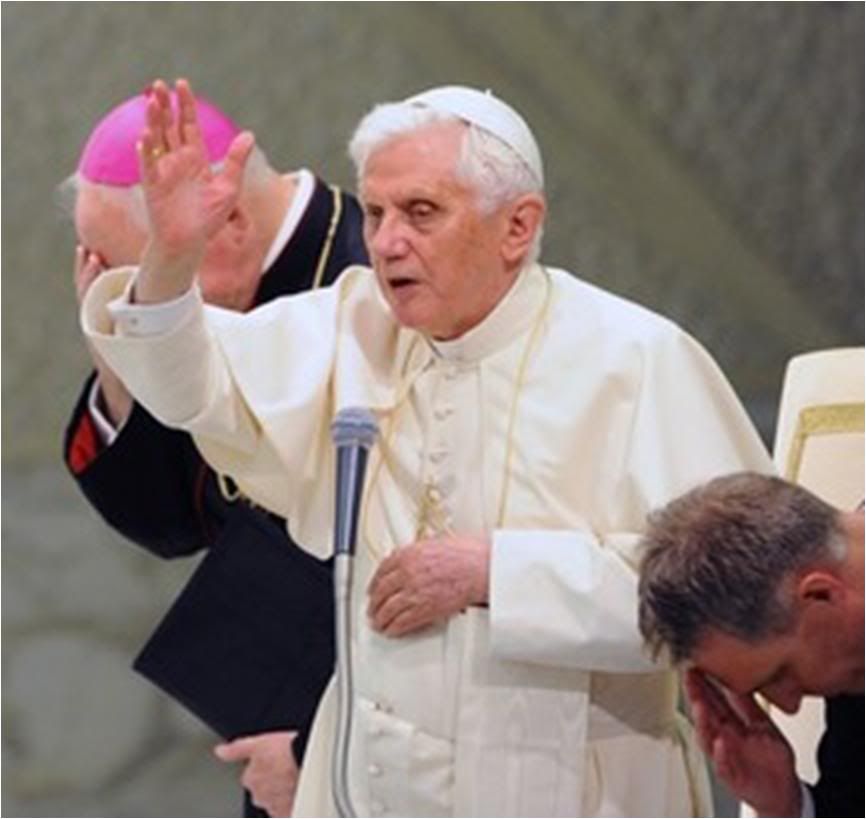
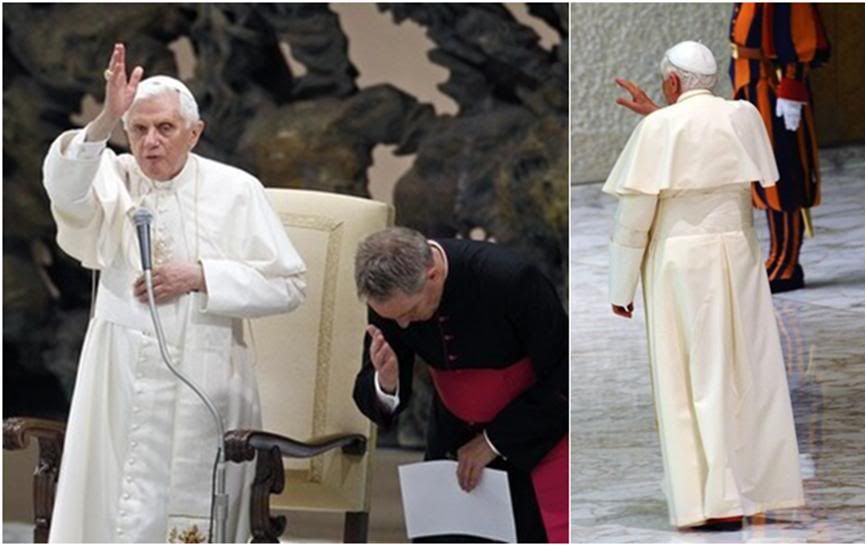 AFP has picked up statements made by the Pope in today's catechesis to imply that he has a fundamental opposition to reforms in the Church! Here is the story, with the headline given to it by the dependably liberal Sydney Morning Herald, [which, by the way, since WYD 2008, appears to have total amnesia about all the positive things it reported about Benedict XVI at the time]:
Pope urges repentance
AFP has picked up statements made by the Pope in today's catechesis to imply that he has a fundamental opposition to reforms in the Church! Here is the story, with the headline given to it by the dependably liberal Sydney Morning Herald, [which, by the way, since WYD 2008, appears to have total amnesia about all the positive things it reported about Benedict XVI at the time]:
Pope urges repentance
for abuse over [=rather than] changes

VATICAN CITY, Sept. 8 (AFP) - Pope Benedict XVI says repentance is more effective than structural change within the Church to counter sexual abuse by priests.
[Since the Pope did not directly cite sexual abuses in his catechesis, what AFP infers and the way it presents it insinuates that the Pope is not all that interested in 'structural changes' to deal with the problem of priests who commit sexual offenses.]
Using an indirect historical analogy, the Pope on Wednesday recalled the words of XII century Saint Hildegard, according to whom "a true renewal of the ecclesiastic community is the result less of structural changes than of a sincere spirit of repentance and an active path towards conversion."
Saint Hildergard at the time was fighting the criticism by German sects "proposing a radical reform of the Church in order to fight abuses by clergy," Benedict told 7,000 pilgrims at his weekly general audience. The Pontiff said Hildergard's was "a message that we should never forget." [And this segues right to the connection the AFP wished to make!]
The Catholic Church has been rocked by a string of recent abuse scandals involving priests, with revelations of the sexual abuse of minors and cover-ups throughout Europe and North America.
In mid-July, the Vatican put in place tougher rules on the handling of sex abuse cases, saying it would accelerate internal investigations and extend by a decade the statute of limitations in such cases.
It is not the first time that Benedict XVI makes the point that true reform within the Church must start with self-purification, and that 'structural changes' are useless without such purification and renewal...
Many of the figures he cited in his catecheses on the great Christian thinkers of the Middle Ages were also the great Church reformers of their time, starting with St. Benedict, through Francis, Dominic and Ignatius, and their successors like Bonaventure and Bernard of Clairvaux.
All were characterized by personal holiness first, above administrative competence, which they also had, and in the same way, their reforms called for individual holiness among the clergy first, which also meant strict adherence to the principles and rules of the Church, rather than changing its structures.
Obviously, no amount of structural change can eliminate sin or perverse tendencies that are inherent in some priests, but greater vigilance in their formation and their daily lives as priests will certainly help. That has always been the duty of the local bishop - it does not involve any structural change, Just attitude change.
[Modificato da TERESA BENEDETTA 10/09/2010 23:25] |